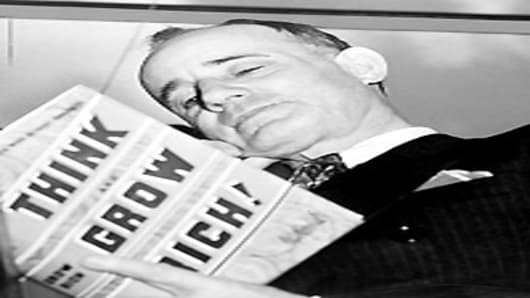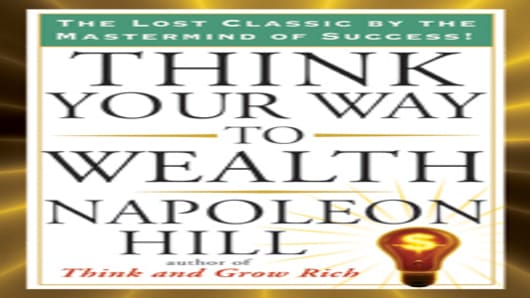Carnegie urged the writer to consult other captains of commerce to determine whether a similar set of practices led to their accomplishments.
Hill spent the next twenty years studying and interviewing businessmen, diplomats, generals, inventors, and other notables in an effort to map out their principles. He finally distilled seventeen traits or habits that each high-achiever seemed to share – from the cultivation of intuition, or a sixth sense, to proper transmutation of “sex energy” in creative endeavors, to convening a “master mind” council of advisers, which could draw ideas from a higher intelligence.
By 1937, Hill’s "Think and Grow Rich" refined Carnegie’s principles – and eased off some their occult qualities. When revisiting the subject of the “master mind” groups, Hill emphasized the manner in which teams of properly motivated individuals could summon ever-greater energies for creative projects. This helped lay the basis for the modern practice of “teamwork.”
Hill’s program also featured sturdy, character-based ideas, such as doing more work than you are paid for, concentrating your energies on one “definite major aim,” and keeping a cap on stormy emotions. Indeed, part of Hill’s contribution to American working life was his insistence that people needed to learn how to get along inside the kinds of large corporations in which more and more Americans were employed.
Hill also had a less appealing side. In his work as a writer and consultant, he sometimes displayed the kind of “yes-man” toadyism and blindness to flaws in corporate leaders, like Carnegie, whom he had admired since his youth.
Yet Hill ultimately produced a large body of articles and books that are more detailed, shrewder, and reveal a better understanding of human nature than many critics suppose. His greatest and least-understood impact, however, was in moving a surprisingly mystical set of ideas into the mainstream of American business life.
Mitch Horowitz is the editor-in-chief of Tarcher/Penguin and the author of Occult America: The Secret History of How Mysticism Shaped Our Nation (Bantam). He is writing a history of the positive-thinking movement, to be published by Crown. Horowitz edited Penguin’s reissue of Think Your Way to Wealth and co-narrated the audio edition. He is online at: www.MitchHorowitz.com.
Email me at bullishonbooks@cnbc.com — And follow me on Twitter @BullishonBooks



